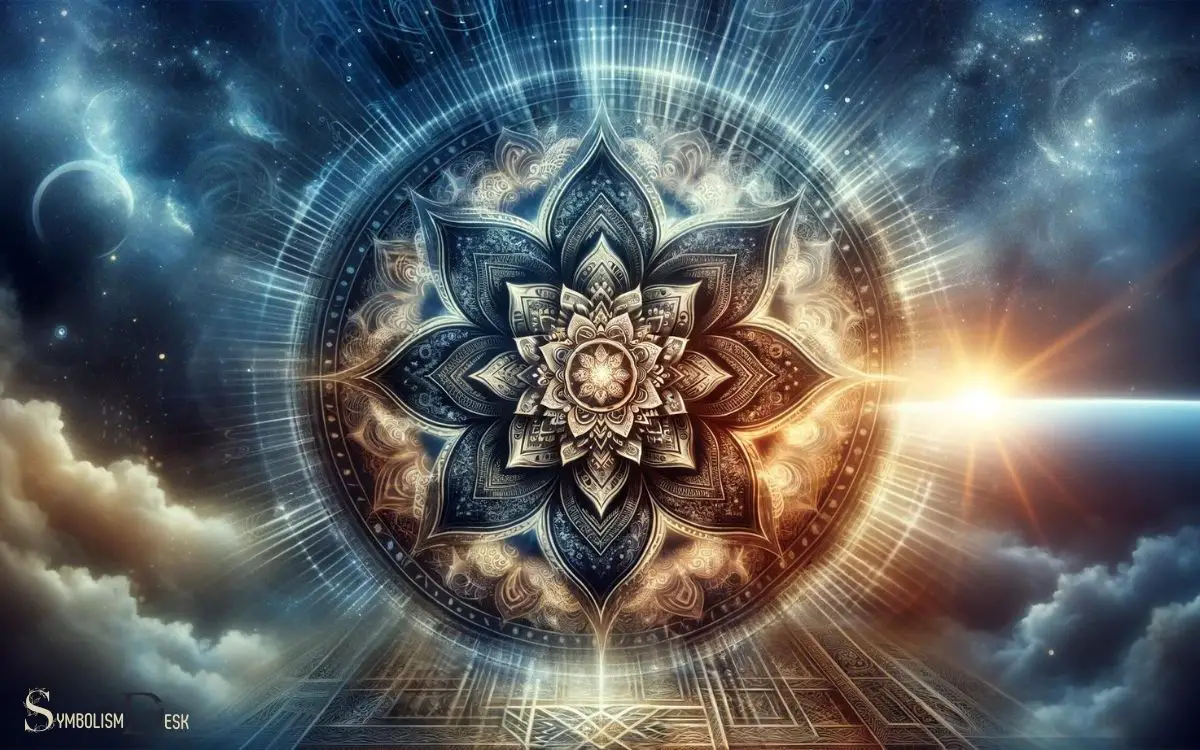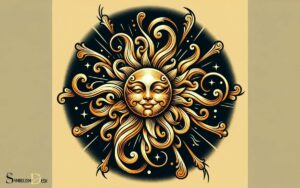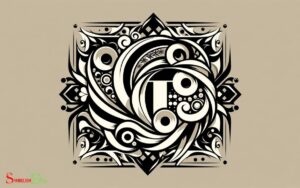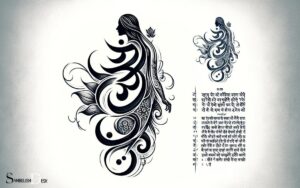What Does a Mandala Tattoo Symbolize? Perfection!
Mandala tattoos represent a variety of meanings such as spiritual connectivity, balance, eternity, and perfection. The design is rooted in ancient symbolism and is often associated with meditation and the journey towards self-awareness.
Mandala tattoos draw their inspiration from the Hindu and Buddhist mandala, which is a complex, symmetrical design intended to represent the universe.
The word ‘mandala’ is derived from the ancient Indian language of Sanskrit, translating to ‘circle.’ Circles have no beginning or end, which is why mandalas are symbolic of eternity.
Here are some key symbolic interpretations:
Adorning one’s body with a mandala tattoo is a profound way to express personal beliefs in the cyclical nature of life and the quest for inner peace.

Key Takeaway
The Origins of Mandala Tattoos
Originating in ancient cultures, mandala tattoos have a rich history that reflects spiritual and religious significance.
The word ‘mandala’ comes from the ancient Indian language of Sanskrit and means ‘circle.’ The use of mandalas can be traced back to various cultures including Hinduism, Buddhism, and Jainism, where they were used as spiritual symbols representing the universe and the cosmos.
In these ancient cultures, mandalas were often used in meditation practices to help individuals focus and establish a sacred space.
Over time, the intricate designs of mandalas have been incorporated into tattoo art, and they continue to carry deep spiritual meanings for those who choose to adorn their bodies with these symbols.
Today, mandala tattoos aren’t only a form of body art but also a way for individuals to express their spirituality and connection to the universe.
Cultural Significance of Mandala Tattoos
A common cultural significance of mandala tattoos is their representation of interconnectedness and harmony within the universe.
In various cultures, mandalas are seen as symbols of the cosmos, unity, and the cyclical nature of life.
Here is a breakdown of the cultural significance of mandala tattoos in different traditions:
| Culture | Significance |
|---|---|
| Hinduism | Represents the universe and the idea that life is never-ending, with the soul’s journey to eternity. |
| Buddhism | Symbolizes the universe and the belief in the interconnection of all beings. |
| Native American | Used in rituals to represent the interconnectedness of all living beings and the cosmos. |
| Celtic | Signifies the interconnectedness of all life and the continuous cycle of nature. |
Mandala tattoos hold deep cultural meanings, reflecting the interconnectedness and harmony valued in various traditions.
Spiritual Symbolism in Mandala Tattoos
Mandala tattoos hold deep spiritual significance for many individuals. They often represent the connection between the inner self and the universe.
The intricate patterns and designs of mandalas are believed to symbolize unity, wholeness, and the cyclical nature of life.
Understanding the cultural and spiritual meanings behind mandala tattoos can provide insight into the profound symbolism they carry for those who choose to adorn their bodies with these intricate designs.
Meaning Behind Mandala Tattoos
While many people are drawn to mandala tattoos for their intricate designs and aesthetic appeal, the spiritual symbolism behind these tattoos is a significant factor in their popularity.
Mandala tattoos carry deep spiritual meanings, often representing the universe, wholeness, and the interconnectedness of all life.
The circular shape of the mandala is believed to symbolize the cyclical nature of life and the cosmos. Moreover, the intricate patterns within the mandala are thought to represent the journey towards enlightenment and self-discovery.
In spiritual practices such as Buddhism and Hinduism, mandalas are used as a tool for meditation and are believed to aid in focusing the mind and establishing a sacred space.
Therefore, the spiritual symbolism behind mandala tattoos adds a profound layer of meaning and significance to the individuals who choose to adorn themselves with these powerful symbols. Mandala tattoos often represent unity, harmony, balance, and the interconnectedness of all living things. The intricate patterns and geometric shapes within mandalas also symbolize the cyclical nature of life and the universe. In addition to mandala tattoos, many people also seek out triangle tattoos for their specific meanings and associations. The triangle tattoo meaning can vary depending on the orientation and style of the triangle, but commonly represents power, stability, and spirituality.
Cultural Significance of Mandalas
The cultural significance of mandalas in relation to spiritual symbolism in mandala tattoos is evident in their use as a tool for meditation and as a representation of interconnectedness.
Mandalas have deep roots in various spiritual traditions, including Hinduism, Buddhism, and Native American spirituality, and they’re revered for their profound symbolism.
- Tool for Meditation: Mandalas are used as a focal point during meditation, allowing individuals to enter a deeper state of consciousness and connect with the divine.
- Representation of Wholeness: The circular shape of mandalas symbolizes the universe and the idea that everything is interconnected and whole.
- Spiritual Guidance: Mandalas are believed to offer spiritual guidance and aid in personal growth and self-discovery. They’re seen as a reflection of the inner self and a reminder of the interconnectedness of all beings.
Mandala Tattoo Designs and Meanings
Mandala tattoo designs have been popularized for their intricate patterns and rich symbolism over the past few decades.
The circular shape of mandalas represents the universe, unity, and wholeness. Each element of a mandala tattoo holds a specific meaning.
The center, or bindu, signifies the starting point of creation, while the outer edges represent the infinite cosmos.
Different geometric shapes within the mandala, such as squares, triangles, and circles, convey various spiritual and psychological concepts.
For example, squares represent stability and balance, while triangles symbolize energy and direction.
Mandalas also often incorporate symbols like lotus flowers, representing purity and enlightenment, or the sun and moon, symbolizing the union of opposites.
Personal Interpretations of Mandala Tattoos
Personal interpretations of mandala tattoos can vary widely, encompassing spiritual meanings, psychological significance, and cultural diversity.
Individuals may find personal connections to the symbolism of mandalas, drawing from their own spiritual or religious beliefs.
Moreover, the psychological aspects of mandalas in tattoos can reflect an individual’s inner journey or personal growth.
Additionally, the cultural diversity in interpretations of mandalas allows for a wide range of personal meanings to be imbued in these intricate designs.
Spiritual Meanings of Mandalas
Many individuals incorporate mandala tattoos into their spiritual journey as a way to symbolize their personal interpretations of the interconnectedness of life and the universe.
- Representation of wholeness: Mandala tattoos are often seen as a representation of the self and the universe as a whole, emphasizing the idea of unity and completeness.
- Symbol of balance and harmony: The intricate patterns and symmetry of mandalas can represent the balance and harmony within oneself and with the external world.
- Reflection of spiritual journey: For some, mandala tattoos serve as a visual reminder of their spiritual journey, representing growth, enlightenment, and the interconnected nature of all things.
Mandala tattoos can hold deeply personal meanings for individuals, reflecting their spiritual beliefs and journey towards understanding the interconnectedness of life and the universe.
Psychological Significance in Tattoos
Discussing the psychological significance in tattoos, individuals often express their personal interpretations of mandala tattoos through the intricate designs and patterns, reflecting their inner thoughts and emotions.
For many, mandala tattoos represent a journey of self-discovery and personal growth. The process of getting a mandala tattoo can be a deeply introspective experience, as the individual contemplates the meaning and symbolism they want to incorporate into the design.
Some may choose specific colors or symbols within the mandala to represent aspects of their personality or life experiences.
The repetitive and symmetrical nature of mandalas can also provide a sense of stability and balance, which may be particularly meaningful for those seeking emotional or psychological equilibrium.
Ultimately, these personal interpretations of mandala tattoos serve as a visual expression of an individual’s inner world and psychological landscape.
Cultural Diversity in Interpretations
The psychological significance in tattoos extends to encompassing diverse cultural interpretations of mandala tattoos, reflecting individuals’ unique perspectives and values.
People from different cultural backgrounds imbue mandala tattoos with their own meanings, influenced by traditions, beliefs, and personal experiences.
- Eastern Philosophy: In Eastern cultures such as Hinduism and Buddhism, mandalas symbolize unity, harmony, and the universe’s wholeness. They’re used in meditation to represent the journey towards enlightenment.
- Native American Traditions: In Native American cultures, mandalas are seen as symbols of the interconnectedness of all living things and the cyclical nature of life.
- Western Individualism: In the Western world, mandala tattoos are often interpreted as a representation of the self, personal growth, and the balance between the inner and outer worlds.
Modern Trends in Mandala Tattoo Symbolism
Modern tattoo enthusiasts commonly incorporate mandalas as a symbolic representation of interconnectedness and spiritual growth.
In modern trends, mandala tattoos often reflect an individual’s personal journey, inner strength, and quest for balance.
The following table provides an overview of modern interpretations and their symbolic meanings:
| Modern Trend | Symbolism |
|---|---|
| Geometric Mandala | Balance, harmony, and connection to the universe |
| Dotwork Mandala | Focus, meditation, and spiritual enlightenment |
| Watercolor Mandala | Fluidity, adaptability, and embracing change |
| Mandala with Sun | Growth, vitality, and the cycle of life |
| Mandala with Moon | Intuition, reflection, and the subconscious mind |
These modern variations reflect the evolving significance of mandala tattoos in contemporary culture, offering individuals diverse ways to express their spiritual beliefs and personal experiences.
Choosing the Right Mandala Tattoo
When selecting a mandala tattoo, individuals often consider various design elements to reflect their personal journey and spiritual beliefs. It’s important to choose a design that resonates with one’s inner self and holds personal significance.
Here are some factors to consider:
- Meaning: The symbolism of the mandala holds great importance. Consider the traditional meanings associated with different elements such as lotus flowers, geometric shapes, or specific colors.
- Placement: The placement of the tattoo on the body can affect its overall impact. Some may prefer a smaller design on the wrist, while others may opt for a larger, more intricate piece on their back or chest.
- Customization: Many individuals choose to customize their mandala tattoos to include specific symbols, patterns, or colors that hold personal significance, allowing for a truly unique and meaningful design.
Conclusion
The mandala tattoo symbolizes the interconnectedness of the universe, inner harmony, and spiritual growth.
Its rich cultural and spiritual significance has made it a popular choice for those seeking a meaningful and visually striking design.
With its intricate patterns and deep symbolism, the mandala tattoo continues to be a timeless and revered art form in the world of body art.






